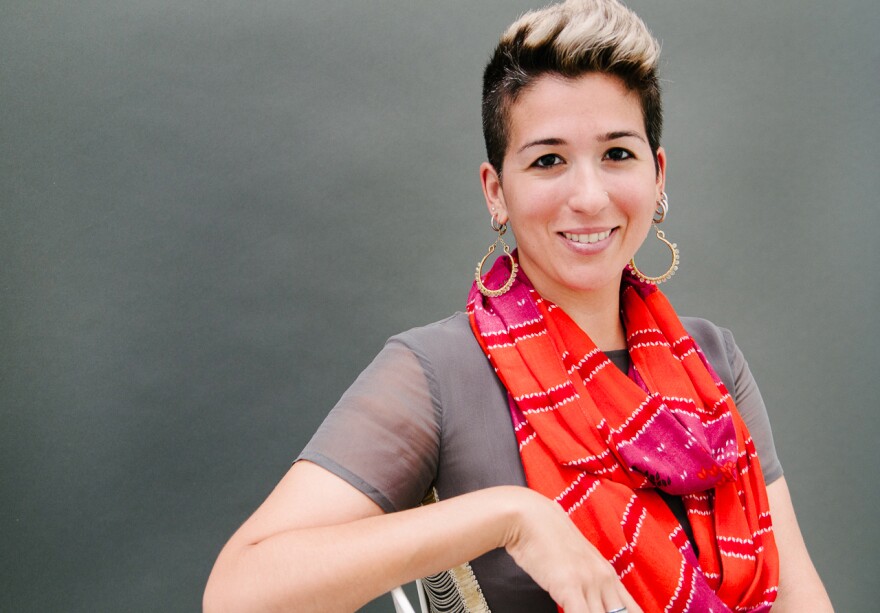This story originally ran October 28, 2014. It was rebroadcast May 6, 2015.
“Taste this, Siomara, and tell me that this doesn’t taste like Cuba.”
“Mom, I don’t know what Cuba tastes like.”
-- from “The Cuban Spring” by Vanessa Garcia
The national media are heavy at the moment with The Cuban Debate. This month The New York Times called on President Obama to end the failed, 52-year-old U.S. trade embargo against Cuba and try engaging the repressive communist regime for a change as a way to reform it.
It’s a discussion that’s increasingly taking place around Cuban-American kitchen tables as well, as a younger generation challenges a half-century of hardline diaspora dogma.
Now into The Cuban Debate comes “The Cuban Spring,” a smart and timely new play by Miami author Vanessa Garcia, produced by New Theatre at the South Miami-Dade Cultural Arts Center. It takes an unflinching look at the divides – generational, spousal, racial – Cuban-American families face today as they contend with what the play calls the island’s “magnet.”
RELATED: America, Florida Want Cuba Policy Change Because They Want Change In Cuba
I spoke with Garcia about “The Cuban Spring” and the Cuban-American evolution her work often examines.
Excerpts:
First, why the title “The Cuban Spring”?
The play takes place in 2011, when the Arab Spring was starting to bubble up and parallels were being made with Cuba. But I think there’s a kind of rebirth that a new generation is bringing to the topics revolving around Cuba. The older generation is passing, and there are moments in which that is very sad, but there are moments in which that opens up a huge amount of freedom for other people to voice opinions.
You grew up in Miami and you call yourself an “ABC,” an American-Born Cuban. And that means, as your play’s protagonist Siomara says, “to be told all your life you’re from a place you’ve never been.”
There is the economic embargo, but there is something I think even bigger that I call the familial embargo. –Vanessa Garcia
There is the economic embargo, but there is something I think even bigger that I call the familial embargo. And so the very thing that drives us toward the island, this cultural information and knowledge, is the very thing that also blocks us. The parents infuse us with it, and then they don’t let us go. So it’s like knowing very deeply a place that you don’t know at all.
We learn that Siomara is pregnant, but she’s uncertain whether she wants to have her baby until she figures out what her identity is. And you seem to be saying: For my generation, that means reconnecting with Cuba.
Absolutely. I don’t think that it would be possible for her to put new life into the world without understanding where she’s come from.
I myself have always wanted to go to Cuba. I had tickets to Cuba, this was now a couple of years ago. Well, I go to my mother’s house and I tell her. She starts to freak out, I mean, in a very over-the-top Cuban bad way, veins sticking out of her forehead. She tells me that she’s literally going to have a heart attack, but she actually did look like she would. And I had to throw away the tickets.
A scene in “The Cuban Spring” involves a similar argument. I won’t give away whether Siomara goes to Cuba. But do you have your own feelings on issues like the embargo?

Yeah. Why I wrote this in the form of a play is because I didn’t want this to be preachy in any way. My mission really was just to stir up a lot of questions. But in essence, yes, I am against the embargo.
At one point a character in the play suggests that when it comes to Cuba, Cubans in Miami have repressed free speech too: “I can’t talk in Cuba,” he says, “and I can’t talk in this house.”
Does the older generation appreciate that there is now a mix of opinions?
He says, “There’s as much Fidelismo in this house as there is in Cuba,” right? I think there are a lot of people that are still afraid to talk in terms of being anti-embargo. But I think that’s changing. I can understand both [sides], but it’s absolutely not black-and-white anymore.
And recently I have convinced my mother to travel to Cuba with me.
So when is this trip going to happen?
As soon as she gets her visa. But it’s interesting, because now my grandfather has dementia. And we have conversations in which we go to Cuba all the time. And he packs and everything…
He literally packs?
He packs. So it’s interesting now looking at the play with these nuances that are happening in my family, feeling like, you know, we are on the brink of some kind of change.
Update: Last November, Garcia and her mother, Jacqueline Diaz-Sampol, did visit Cuba together. Garcia's first novel, "White Light," will be published in September.
Tim Padgett is WLRN's Americas editor. You can read more of his coverage here.






